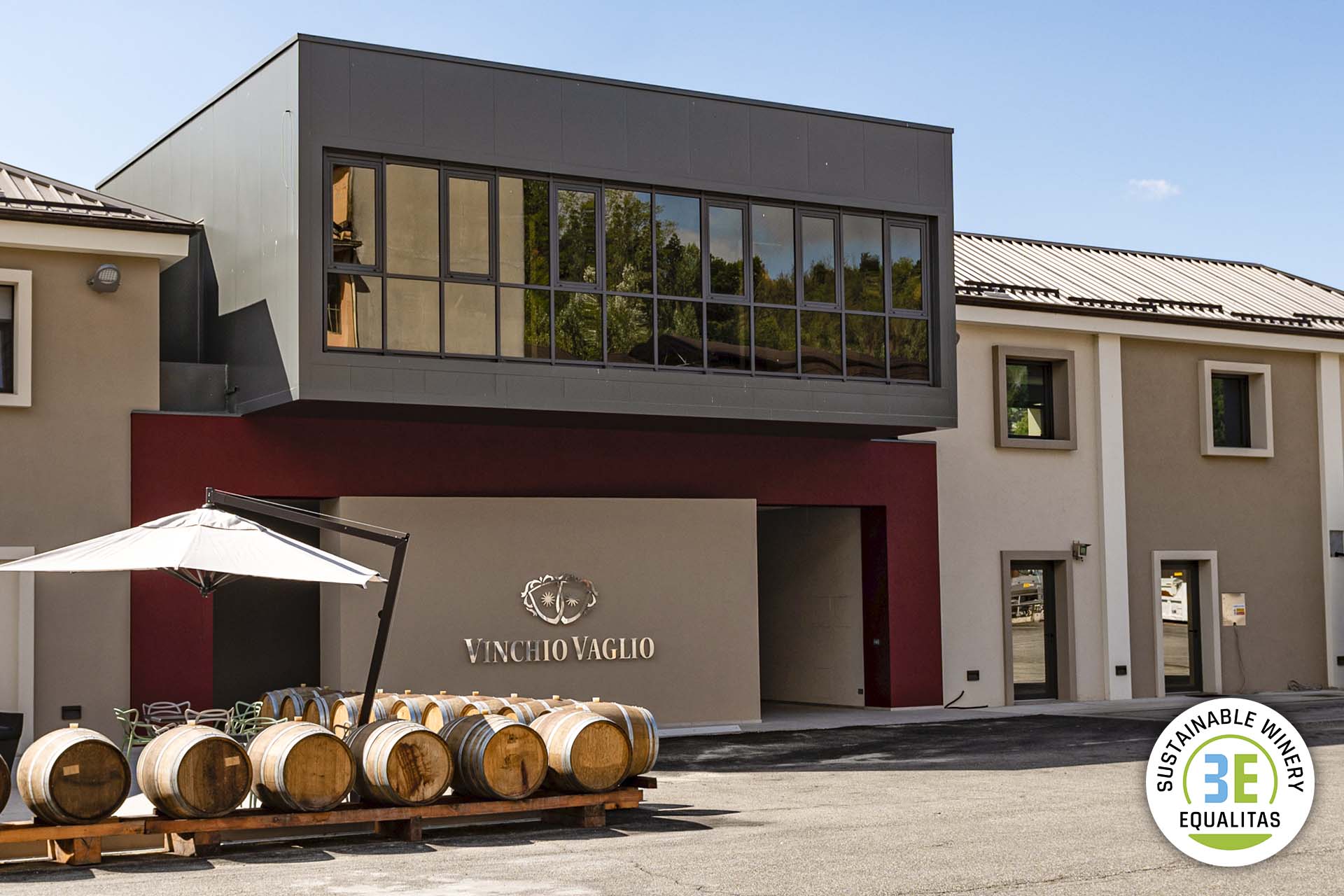For us at Vinchio Vaglio, sustainability has always been a triangle with three equally important vertices relating to territory, people and economy. A triangle that has the shape of grapes and that we wish to share with you transparently, in all its essential steps.
Environmental sustainability
The choices regarding wine-making:
- Bottles – The production and handling of wine bottles has natural consequences on CO2 emissions, so much so that it accounts for 42% of wine’s total carbon footprint. This is why Vinchio Vaglio uses bottles weighing less than 420 grams for 80% of its entire production.
- Stopper – The choice between a technical stopper and a natural cork stopper is subject to rigorous bottling simulations on different wines. Vinchio Vaglio, thanks to the attentive choice of the right cork for each bottle, has reduced its environmental impact by 66.4 tonnes of CO2 per year.
- Bag in Box – Reduced transport costs, less packaging and materials that are easier to recycle than glass. Such arguments that reduce the carbon footprint of wine packaging by more than 7%, thanks to the use of Bag in Box since 2009 for specific wines.
- Renewable energy – Thanks to the 200 kWp photovoltaic system installed in 2011, Vinchio Vaglio is able to cover a significant part of the company’s energy needs, which it aims at completely absorbing within the next few years.
In addition, new 200 kwh of solar panels and 100 kwh of accumulator batteries have been installed, reaching a total of 400 kwh (plus batteries) that allow self-sufficiency in energy all year round, except during the harvest period. - Treatments in the vineyard – Agronomists aim at reducing the use of chemical products to the bare minimum: copper sulphate, sulphur and leguminous cover crops are used instead of systemic products and herbicides. Treatments are not scheduled, but rather only carried out when necessary, to prevent the development of pathogens. For the Vigne Vecchie wines, the vines are worked by hand, with no CO2 emissions, treatments are only made with sulphur and copper sulphate, and fertilisation is also organic only.
- In winemaking – The sulphites in our wines are always 30-40% below the legally permitted values. We also only use selected yeasts from our locale area to start fermentation, helping to keep the characteristics of the grape variety and terroir intact.
- In the company – Vinchio Vaglio has always been committed to an environmental approach that makes all employees aware of their responsibilities.
The choices regarding the protection of historic legacy and landscape tradition:
- Project Vigne Vecchie – The project stems from the selection of the most suitable vineyards that are over 50 years old. The idea was born in the mid-1980s, in complete contrast to what was happening in the rest of Italy, to safeguard the historic heritage of the oldest vineyards and thus give Barbera the utmost dignity.
- Monferrato UNESCO Heritage – The registration of Monferrato hills on the World Heritage List is also recognition of the hard work of all the members of the Cooperativa Vinchio Vaglio. In fact, had it not been for the Cantina, many winegrowers in the area would have been forced to uproot and make way for woodland or hazelnut groves.
- Redevelopment of the routes within Val Sarmassa – From the ‘path in the Nidi’ to the Big Bench no. 94, passing through the installations of the artist Giancarlo Ferraris and the herb garden. These, as well as others, are the concrete initiatives for the protection and enhancement of Val Sarmassa.
Social sustainability
- Opportunity – The Cantina Cooperativa was born out of the need to balance the socio-economic imbalance that existed in the market in the 1950s, and, yesterday as today, for more than 192 members of Vinchio and Vaglio Serra, the Cantina represents the employment opportunity of being able to continue working the land handed down through generations.
- Inputs and resources – 100% of the grapes are sourced from the Monferrato area, in the areas adjacent to the Cantina Cooperativa, by the members who cultivate around 470 hectares.
- Nutrition awareness – Our choices are not just about product safety, as we also cherish the importance of the concept of responsible drinking, and we implement it in all areas of our business.
- Support of the territory – Cantina Cooperativa Vinchio Vaglio has always supported the territory where it is located, also through participation and sponsorship of events and shows that are organised by associations or neighbouring towns, in order to actively contribute to socio-cultural support.
Economic sustainability
- Assistance services, equipment and know-how – Vinchio Vaglio’s members give 100% of their grapes to the winery, receiving in return constant help in their delicate work and enabling the economic sustainability of winemaking.
- The assembly – The vote cast by each member carries an individual weight, which is not at all related to the size of the land. With this in mind, the President and Vice-President are key figures in propelling the Cantina Cooperativa towards a virtuous economy.
- Research and development – Technical progress is at the heart of the Cantina Cooperativa’s priorities, with the aim of improving the social and economic conditions of the entire farming population in the area. The new grape-collecting system integrated with Industry 4.0 (one of the first in Piedmont) and the complete restyling of the company brand in 2020 go in this direction.
- Internationalisation – Barbera d’Asti, Barbera Superiore DOCG and Piemonte DOC Barbera are our most exported wines, which are appreciated in China, Japan, Korea, Australia, Canada, Denmark, Belgium, France, Germany, Holland, Poland, Sweden, Switzerland, the UK and the USA. A result that represents 11% of the winery’s turnover and brings our marvellous Monferrato to international prominence.
Vinchio Vaglio is Sustainable Winery
With the Equalitas certification, we can finally claim we are a Sustainable Winery in all respects, thanks to the best practices that have been consolidated over time and the continuous improvement of our sustainability standards.
It is the recognition of a long journey that supports the value of our decisions. A certification that testifies to our serious commitment to protecting the land. An official recognition that clearly states our direction towards a more sustainable world.
You can read our in-depth article on achieving the Equalitas certification here.

Certified quality
Our commitment to quality touches the entire production process: from the vineyard to the delivery of the bottle to the customer, under the requirement of traceability of all data.
Sustainable development, food safety and optimal customer satisfaction are our daily commitment, which is expressed in Quality Control, international awards and certifications obtained over the years:
EQUALITAS – Sustainable Winery

Sustainability Report 2024
Sustainability Report 2023
Sustainability Report 2022
Dichiarazione di politica aziendale per la qualità, l’ambiente, la sicurezza sul lavoro e la sicurezza alimentare 
Company statement for quality, environmental, safety at work and food safety policy 
UNI EN ISO 14001:2015 

Food Safety Management System ISO 22000:2018 
UNI EN ISO 9001:2015 

UNI EN ISO 22005:2008 “Vigne Vecchie”

UNI EN ISO 45001:2023 

Dichiarazione di conformità HACCP 
Declaration of conformity HACCP 
Organic production Method 

Organic Barbera Certificate 

ICEA Certificate




